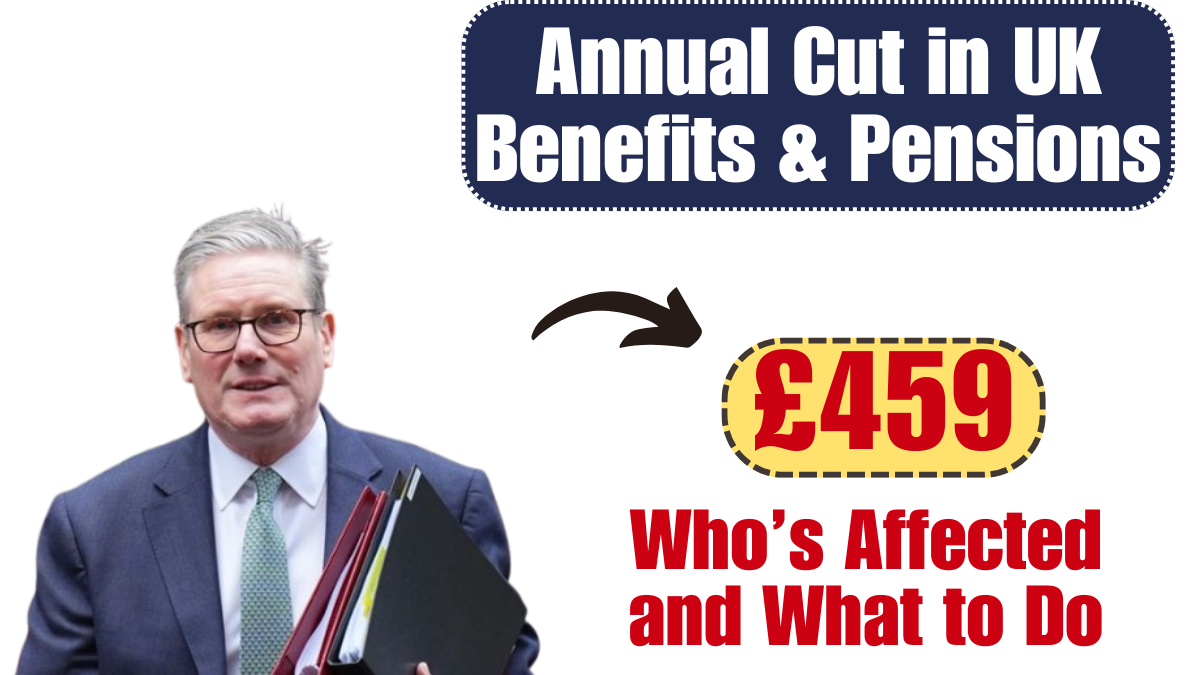In 2025, the UK government announced a broad welfare reform package expected to reduce benefits and pensions by an average of £459 per recipient annually. For some, especially those dependent on Personal Independence Payment (PIP) or Universal Credit (UC), losses could exceed £4,000 per year.
The policy aims to cut £5 billion in annual spending by 2030. But critics argue the changes disproportionately affect pensioners, disabled individuals, and low-income families.

Key Highlights of the Welfare Changes
| Aspect | Details |
|---|---|
| Annual Reduction | £459 average cut per year |
| Affected Groups | Pensioners, disabled individuals, low-income families |
| Government Goal | Save £5 billion annually by 2029–30 |
| Major Changes | PIP eligibility tightening, Winter Fuel Payment cut, Universal Credit adjustment |
| High-Impact Estimate | Up to 1.2 million people may lose £4,200–£6,300 annually |
| Official Source | UK Department for Work and Pensions (DWP) |
What’s Changing – Detailed Breakdown
1. Personal Independence Payment (PIP)
The PIP system is being overhauled with a focus on “work readiness” and stricter eligibility. Reassessments will now apply even to people with mental health conditions and invisible disabilities.
-
Key Changes:
-
More rigorous assessments
-
Mental health reassessments
-
Replacement of Work Capability Assessment with new evaluation methods
-
-
Impact: Up to 1.2 million individuals could lose between £4,200 to £6,300 annually
2. Winter Fuel Payment
This once-universal support is now means-tested, available only to those on Pension Credit or similar income-based benefits.
-
Was: Up to £300 per year to help with heating
-
Now: Only low-income pensioners qualify
-
Impact: Over 10 million pensioners lose eligibility; around 100,000 could fall into fuel poverty
3. Universal Credit (UC)
Adjustments include increased standard rates, but reductions to health-related top-ups and limited eligibility for young adults with disabilities.
-
Key Adjustments:
-
Top-ups frozen or reduced
-
Young adults (under 22) excluded from some support
-
-
Impact: Around 600,000 recipients could lose up to £2,400 per year by 2029
Real-World Scenarios of Impact
-
Retired Pensioner
-
Loss of Winter Fuel Payment: £300
-
Increased heating costs: £159
-
Total loss: ~£459 annually
-
-
Single Mother with Disability
-
Loss of PIP (£80 per week)
-
Reduced UC support
-
Total loss: £4,000+ annually
-
-
Young Adult with Mental Health Challenges
-
Denied PIP under new rules
-
Loss of UC health top-up
-
Risk: Homelessness, financial instability
-
How to Respond – Action Plan for 2025
Step 1: Recheck Your Entitlements
-
Use the Gov.uk benefits calculator
-
Ensure you’re not missing out on unclaimed support
Step 2: Apply for Pension Credit
-
Many pensioners miss out
-
Restores eligibility for Winter Fuel Payment and other benefits
Step 3: Get Help from Trusted Organisations
-
Citizens Advice
-
Turn2Us
-
Age UK
Step 4: Reduce Household Costs
-
Apply for ECO4 energy efficiency schemes
-
Seek local council support for insulation or heating upgrades
Step 5: Engage in Policy Consultations
-
The DWP is holding public consultations
-
Contact your local MP to raise concerns if you’re affected
Public Response and Criticismr
-
Citizens Advice: Warns of increased food bank use and unpaid debts
-
TUC: Describes it as “austerity rebranded”
-
Disability Rights UK: Calls the cuts “devastating and immoral”
FAQs
What is the average reduction in benefits for 2025?
The government estimates an average loss of £459 per year per recipient, though individual losses may be much higher.
Who is most affected by the new reforms?
Pensioners, disabled individuals receiving PIP, and low-income Universal Credit claimants are the most affected.
Can I still receive Winter Fuel Payment?
Only if you qualify for Pension Credit or certain other income-based benefits. It is no longer a universal payment.
What’s changing in PIP eligibility?
Eligibility is becoming stricter, especially for invisible conditions and mental health. A new “work readiness” assessment will replace the Work Capability Assessment.
How can I appeal if my benefits are reduced?
You can request a Mandatory Reconsideration from the DWP and, if unsuccessful, appeal to a tribunal. Seek help from Citizens Advice or legal aid services.
Where can I check if I’m still eligible for benefits?
Visit Gov.uk and use the Benefits Calculator. You may also consult Citizens Advice or Turn2us for free guidance
Conclusion
The £459 annual reduction in UK benefits and pensions is just the average figure. For many, the real impact could be devastating. As these welfare changes take hold, it’s vital to stay informed, check your entitlements, and seek expert help when needed. While the government defends its approach as necessary fiscal reform, the true cost may be paid by the nation’s most vulnerable.
Click here to know more.
Aanchal is a passionate writer with a keen interest in storytelling, content creation, and creative expression. She enjoys exploring diverse topics and crafting engaging narratives that captivate readers.

